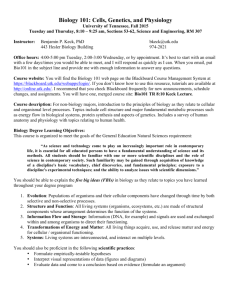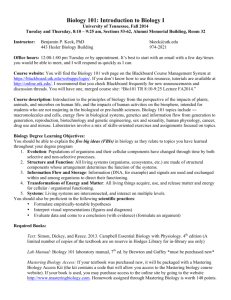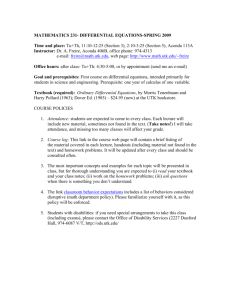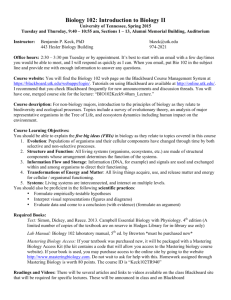docx - Brian O'Meara Lab
advertisement
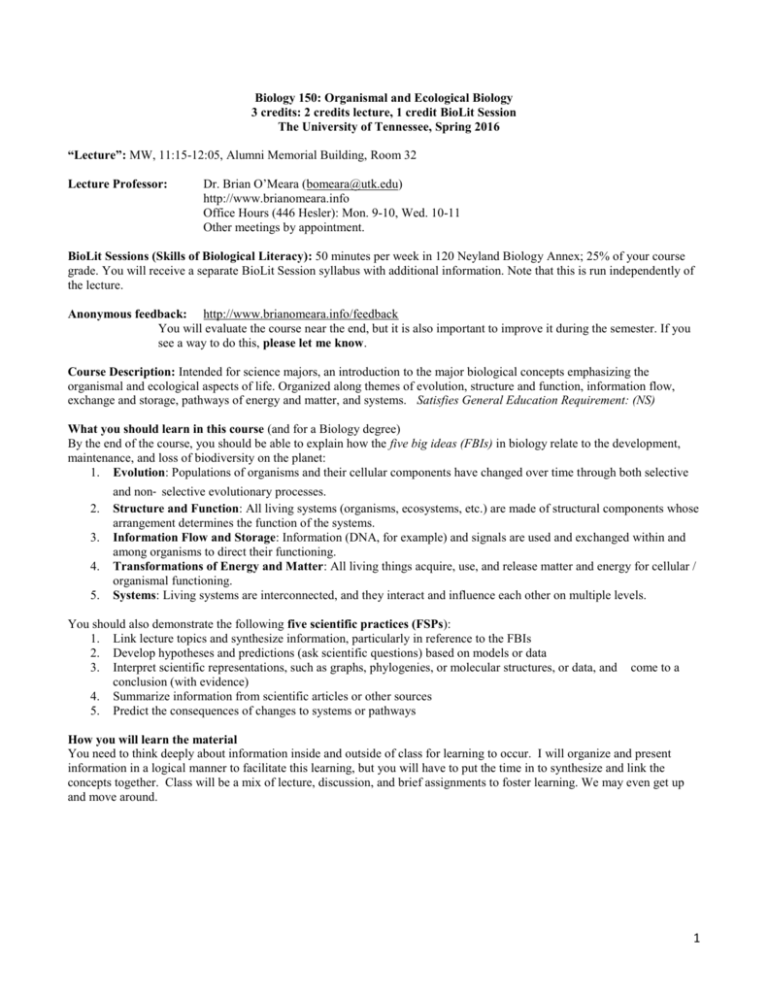
Biology 150: Organismal and Ecological Biology 3 credits: 2 credits lecture, 1 credit BioLit Session The University of Tennessee, Spring 2016 “Lecture”: MW, 11:15-12:05, Alumni Memorial Building, Room 32 Lecture Professor: Dr. Brian O’Meara (bomeara@utk.edu) http://www.brianomeara.info Office Hours (446 Hesler): Mon. 9-10, Wed. 10-11 Other meetings by appointment. BioLit Sessions (Skills of Biological Literacy): 50 minutes per week in 120 Neyland Biology Annex; 25% of your course grade. You will receive a separate BioLit Session syllabus with additional information. Note that this is run independently of the lecture. Anonymous feedback: http://www.brianomeara.info/feedback You will evaluate the course near the end, but it is also important to improve it during the semester. If you see a way to do this, please let me know. Course Description: Intended for science majors, an introduction to the major biological concepts emphasizing the organismal and ecological aspects of life. Organized along themes of evolution, structure and function, information flow, exchange and storage, pathways of energy and matter, and systems. Satisfies General Education Requirement: (NS) What you should learn in this course (and for a Biology degree) By the end of the course, you should be able to explain how the five big ideas (FBIs) in biology relate to the development, maintenance, and loss of biodiversity on the planet: 1. Evolution: Populations of organisms and their cellular components have changed over time through both selective 2. 3. 4. 5. and non‐ selective evolutionary processes. Structure and Function: All living systems (organisms, ecosystems, etc.) are made of structural components whose arrangement determines the function of the systems. Information Flow and Storage: Information (DNA, for example) and signals are used and exchanged within and among organisms to direct their functioning. Transformations of Energy and Matter: All living things acquire, use, and release matter and energy for cellular / organismal functioning. Systems: Living systems are interconnected, and they interact and influence each other on multiple levels. You should also demonstrate the following five scientific practices (FSPs): 1. Link lecture topics and synthesize information, particularly in reference to the FBIs 2. Develop hypotheses and predictions (ask scientific questions) based on models or data 3. Interpret scientific representations, such as graphs, phylogenies, or molecular structures, or data, and come to a conclusion (with evidence) 4. Summarize information from scientific articles or other sources 5. Predict the consequences of changes to systems or pathways How you will learn the material You need to think deeply about information inside and outside of class for learning to occur. I will organize and present information in a logical manner to facilitate this learning, but you will have to put the time in to synthesize and link the concepts together. Class will be a mix of lecture, discussion, and brief assignments to foster learning. We may even get up and move around. 1 Schedule: (subject to change) Note that it snows in Knoxville. Review the University’s inclement weather policy: http://safety.utk.edu/emergencymanagement/inclement-weather-policy/ Date Class Chapter 13-Jan Intro to the class, pretest 18-Jan Martin Luther King Jr. Day 20-Jan Individuals to ecosystems 1.4, 1.5, 52.1, 57.1, 57.3, 54.1 25-Jan Genes and DNA 4.1, 4.2, 12.1, 12.2, 13.1, 13.2, 14.1, 14.2, 16.1-16.4 27-Jan Genes, individuals, and species 1-Feb Genes, populations, and species 26.1 3-Feb Mechanisms of evolution: natural selection 1.3, 25.1, 25.3, 25.4, 25.5, 26.3 8-Feb Other mechanisms of evolution 26.2, 26.4-26.6 10-Feb Speciation 27.1-27.3, 28.3 15-Feb Time / Phylogenies 1.4, 25.2, 28.1, 28.2, 28.4 17-Feb Exam 1 (including Feb 15 material) 22-Feb Population ecology 54.3, 54.5 24-Feb Community ecology 55.1 29-Feb Energy and ecosystems 56.1-56.3 2-Mar Island biogeography 55.4 7-Mar Global biogeography 52.3-52.4 9-Mar Exam 2 (including March 7 material) 14-Mar Spring break 16-Mar Spring break 20-Mar Three domains of life 7.1, 29.1-29.4 23-Mar History of life 28.2, 28.3, 28.4 28-Mar Animals 35.1-35.3 30-Mar Animals, including humans 35.4 4-Apr Animals 33.1-33.4, 34.1-34.3 2 7-Apr Fungi 32.1-32.4 11-Apr Plants 31.1-31.4 13-Apr Plants 31.1-31.4 18-Apr Exam 3 (including April 13 material) 20-Apr Loss of biodiversity 57.2, 57.3 25-Apr Conservation of biodiversity 57.4 27-Apr Capstone: Global warming & its effects 56.3 5-May Final exam, 10:15 am - 12:15 pm Technology: The use of laptops , phones, or other electronic devices in class is banned (of course, with exceptions for required adaptations or accommodations: see Disability Services section). Yes, this means you cannot use your laptop for taking notes. If I were a student, I would be quite annoyed by this rule: I type far faster than I write and I find writing a pain. However, there are two reasons for this: even if you have the best intentions, I have found that use of technology by others leads to distractions as people attempt to multitask during lecture. More importantly, in this class we use science: that is, test preconceived ideas with experiments or other sources of data and change our minds if we were wrong. There are many studies that show that taking notes longhand results in shorter notes (rather than verbatim transcription of what the instructor says) but much better long term retention. Here’s a figure from a recent study (Mueller and Oppenheimer, 2014) which has received a lot of attention in the popular press (Scientific American, The Atlantic): Where a higher number on the y axis indicates better retention of information (as measured by performance on a test). Taking notes longhand on paper, then studying, outperformed taking notes longhand and not studying, and both outperformed overall taking notes on a laptop, whether or not these notes were studied (except for factual questions: there, longhand with studying still was best, but laptop with studying was better than longhand without studying). My role as instructor is not to make you happy, but rather to help you learn (that’s why you’re spending all this time and money to go to college); this is a simple way to achieve that. 3 Support for learning Texts and Materials: Text: Freeman, Scott. 2014. Biological Science (5th ed). Pearson Publishing. This book is available at the bookstore in loose leaf form, bundled with the MasteringBiology software you also need (see below). You can also purchase it as an e‐ Book from Pearson Publishing directly (www.masteringbiology.com) along with the software. The library also has a limited number of textbook copies on reserve. Mastering Biology software: free with purchase of a new textbook at bookstore; you can also purchase the software directly from masteringbiology.com, but you need to purchase it WITH the eText. To access: select textbook, and: Zip code: 37996‐ 1610; Course ID: MBOMEARA34591. REQUIRED - TurningPoint response “clicker” (“ResponseCard” - Instructions for registration and use are found on the lecture Blackboard site). At the UT Bookstore Other readings will be assigned and posted on Blackboard Textbooks are expensive. We will actually be using this one, so it is important to get. The clickers will be used on numerous in-class questions. Mastering biology represents 225 of 750 lecture points. I’d also suggest watching some quality nature documentaries, like BBC’s Planet Earth, Life, and Blue Planet. I’m not going to require you to get an account on a streaming service to watch them (as much fun as it would be to say, “I have to subscribe to Netflix – it’s required for my class), and you will never be tested on any of this, but watching a few episodes online, borrowing the DVDs from the library, etc. will help you develop a much better sense of biodiversity. It is not nearly as good as being in the field, but it is a fast way to see some of the immense diversity that results from evolution as well as how ecology affects what organisms do, and it will really help your intuition when we discuss processes and organisms. Course website: http://online.utk.edu/ (Blackboard). You will have two Blackboard sites for the course, one for your BioLit section and one for lecture. The lecture site will be used regularly for communication and posting lecture syllabus, extra readings, assignments, course grades, etc. Communications: If you need to meet and can’t make office hours, please use your UTK e-mail (spam filters may exclude other addresses) to schedule a meeting. Please allow up to 2 working days for responses to your email. Even better than email is posting questions to the course discussion board, on BlackBoard. I still get an email about it but someone else may answer you sooner. It also helps me because questions can be answered once there and read by everyone. Study Rooms: 417 Hesler is a quiet study room for majors in Biology. It can also be reserved for group study. There is also a student study room in Neyland Biology Annex, room 103. Assessment of your learning Assessment (quizzes, exams, and assignments) is very important to the learning process. It lets both you and me know what you understand and what you do not. I quiz often because it encourages you to keep up with your studying and help you learn – every time you have to re-process information you learn more. Although much of the assessment in this course will be by multiple choice, I will also use short answer and written assignments because this type of assessment helps you learn in a different way. You must be able to explain your understanding of a topic versus just being able to pick it out of a list. Mastering Biology, online, is a key part of your assessment. There are assigned reading quizzes for EVERY chapter. You must do them at least the day before we first cover that chapter in class (see the syllabus). On the mastering biology website, the assignment due day is set for a few minutes after midnight of the listed day. 4 iNaturalist: This course is about organismal and ecological biology: a big part of that are actual organisms. I want to you to actually go look at them. To do this, we’re using iNaturalist: it’s free, and can run on iOS (iPhones, iPads), Android, web browsers on laptops or desktops, etc. Once you create an account (use your UT short user name (your email address before the ‘@’) if possible), join the Bio150 project. I require to you make observations of the following six organisms: A fungus A vertebrate that is not a rodent or bird An insect An invertebrate that is not an insect An angiosperm A plant that is not an angiosperm They must be wild: no mushrooms from Food City, red pandas at the Knoxville Zoo, or oak trees on campus. Identify it as precisely as you can without being uncertain, add it to the Bio150 project, and include detailed notes. Ideally include a photo (I will not require this since it could be hard for those without phones or cameras, but please try). Lecture: (75% of grade: 750 points): Assessment Max score Exam 1 Exam 2 Exam 3 Final Mastering Biology Clickers/Other iNaturalist 100 100 100 150 225 70 (assigned 90) 5 Percentage of lecture grade 13% 13% 13% 20% 30% 9% 1% Note that the clicker/other points are graded out of 70, though 90 points will be assigned. You may get a maximum of 70 points for this, so it’s not extra credit, but it does let you miss a few classes (due to things like flu) without it affecting your grade by missing clicker points. BioLit Session: (250 points) – see BioLit Session syllabus. Exams / Quiz / Assignment Policies: NO make-up quizzes or assignments will be given; there are 20 “extra” points built into the course to allow for missing classes, forgetting your clicker, etc. NO make-up exams will be given without a valid excuse (e.g., family emergency, medical emergency, etc). The excuse MUST be documented. I know this is a hassle, but it cuts down on false claims. Note that I do not need details: a note from a nurse saying “Student X was absent for well-justified medical reasons” suffices – protect your privacy. If at all possible, let me know ahead of time you will be missing it. Make-up exams may be short answer, fill-in-the-blank, or essay. Assignments turned in after the due date will lose 25% of the points per 24 hours after the deadline. This includes Mastering Biology assignments. During exams and quizzes, any electronic device seen on your desk or within sight will result in a grade of zero. The intention is that final letter grades will be determined by the total percentage of 1000 points accumulated as follows: A [93 – 100]% C [73 – 77)% A[90 – 93)% C[70 – 73)% B+ [87 – 90)% D+ [67 – 70)% B [83 – 87)% D [63 – 67)% B[80 – 83)% D[60 – 63)% C+ [77 – 80)% F <60% 5 It is unlikely, but note that this may be scaled up or down at the end so that grades in this instance of the course are comparable to those with other instructors in other semesters. Essentially, a student with a B+ from this course should have emerged with the same amount of knowledge as a student from a different instance of this course. Also remember that the BioLit grade contributed a quarter of the total grade: it can “save” you a bit if you do well there. Academic integrity: Academic dishonesty of any sort will not be tolerated. Plagiarism includes the copying of phrases, portions of sentences or the main ideas from ANYONE on ANY work submitted for a grade (exams, papers, quizzes, etc). Using a clicker for a friend who will miss class is strictly forbidden: it is tantamount to taking someone else’s test. Both involved students will be penalized. Depending on the offence, penalties for academic dishonesty range from a minimum of a zero for the assignment, to an F for the course, to the filing of formal academic dishonesty charges seeking dismissal from The University of Tennessee. These choices are at the discretion of the instructor, and can occur in either the lecture or the lab portion of the class. You should be familiar with the requisites of academic honesty and what constitutes academic dishonesty as outlined in the Undergraduate Catalog (http://catalog.utk.edu/). Other course information Final exams: Finals are scheduled by the University Registrar during the university final exam period. There are no conflicting times. “Students are not required to take more than two written exams on any day. The instructor(s) of the last non-departmental exam(s) on that day must reschedule the student's exam during the exam period. It is the obligation of students with such conflicts to make appropriate arrangements with the instructor at least two weeks prior to the end of classes.” “All final exams must be given during the final exam period at the scheduled time.” (http://registrar.tennessee.edu/academic_calendar/finalexams.shtml) Disability Services: If you need course adaptations or accommodations because of a documented disability, please contact me privately to discuss your needs. If you have questions or concerns about disabilities or emergency information to share, please contact Disability Services: 100 Dunford Hall; 974‐ 6807 or 865‐ 622‐ 6566 for video phone; Email: ods@utk.edu; Website: http://ods.utk.edu/). Counseling Center: http://counselingcenter.utk.edu/ 1800 Volunteer Boulevard 865 974-2196, Email: counselingcenter@utk.edu Academic Assistance: Tutoring: The Division of Biology does not offer tutoring services. Contact the Student Success Center and the Academic Support Unit of The Office of Minority Student Affairs for information about tutoring opportunities. Student Success Center: The comprehensive source for information, services, and resources to assist your success at UT: http://studentsuccess.utk.edu 812 Volunteer Boulevard, Greve Hall, room 324 865 974‐ 6641, Email: studentsuccess@utk.edu Technical Assistance: Blackboard, clickers, or general information technology assistance: http://remedy.utk.edu/contact/ This syllabus is subject to change at the discretion of the instructor References: MUELLER, P. A., and D. M. OPPENHEIMER. 2014. The Pen Is Mightier Than the Keyboard: Advantages of Longhand Over Laptop Note Taking. Psychological Science 25: 1159-1168. 6
